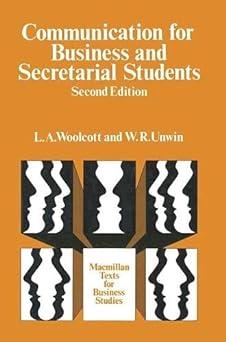Read carefully the following extract from one of the scripts of Civilisation, a television series by Kenneth
Question:
Read carefully the following extract from one of the scripts of Civilisation, a television series by Kenneth Clark, and then attempt the questions below it.
When I look at the world about me in the light of this series, I don't at all feel that we are entering a new period of barbarism. The things that made the Dark Ages so dark - the isolation, the lack of mobility, the lack of curiosity - don't obtain at all. When I have the good fortune to visit one of our new universities, it seems to me that the inheritors of all our catastrophes look cheerful enough - very different from the melancholy late Romans or pathetic Gauls whose likenesses have come down to us. In fact I should doubt if so many people have ever been as well-fed, as well-read, as bright-minded, as curious and as critical as the young are today.
Naturally these bright-minded young people think poorly of existing institutions and want to abolish them. Well, one doesn't need to be young to dislike institutions. But the dreary fact remains that, even in the darkest ages, it was institutions that made society work, and if civilisation is to survive, society must somehow be made to work.
At this point I reveal myself in my true colours: as a stick-in-the-mud. I hold a number of beliefs that have been repudiated by the liveliest intellects of our time. I believe that order is better than chaos, creation better than destruction. I prefer gentleness to violence, forgiveness to vendetta ..
On the whole I think that knowledge is preferable to ignorance, and I am sure that human sympathy is more valuable than ideology. I believe in courtesy, the ritual by which we avoid hurting other people's feelings by satisfying our own egos.
(a) Indicate clearly the meaning or force of the following words in the extract:
institutions vendetta ideology egos
(b) Lord Clark calls himself a stick-in-the-mud .. From your reading of the extract suggest a better and fuller description of his views in not more than ten words.
(c) Comment on any unintentional revelations about himself which Lord Clark communicates when he says one of the following:
'these bright-minded young people'
'I believe ... ' (last sentence)
Step by Step Answer:

Communication For Business And Secretarial Students
ISBN: 9780333148679
2nd Edition
Authors: Lysbeth A Woolcott






